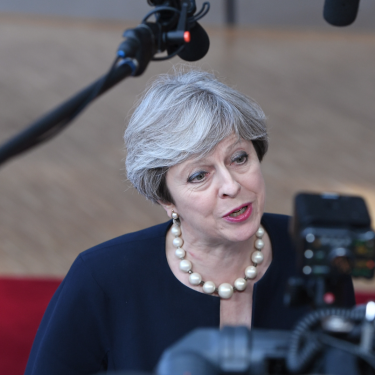As new parliament opens, RSF calls on the UK government to reverse negative press freedom trends

Following the State Opening of Parliament on 21 June, Reporters Without Borders - known internationally as Reporters sans frontières (RSF) - calls on the government to take immediate steps to reverse the negative press freedom trends of the past year and improve the climate for free expression in the UK.
Since Theresa May became Prime Minister in July 2016, her government has enacted a number of worrying moves to restrict press freedom, resulting in the UK dropping two places to a ranking of 40th out of 180 countries in RSF’s 2017 World Press Freedom Index.
One notable case is that of Zaina Erhaim, an award-winning Syrian journalist who was detained and questioned in September 2016 at London Heathrow airport, where UK border authorities seized her passport, which had falsely been flagged as stolen by the Assad regime. The move left Erhaim and her infant daughter at risk, and nine months later, the Home Office still refuses to return her passport or provide Erhaim with other concrete assistance.
As Home Secretary, May herself authored the menacing Investigatory Powers Act, which was adopted in November 2016 and has been described as “the most extreme surveillance law in UK history”. RSF has cautioned the law could serve as an effective “death sentence for investigative journalism” in the UK as it does not contain sufficient mechanisms to protect whistleblowers, journalists, and their sources.
In parallel to the Investigatory Powers debate, issues around press regulation once again came to a head in November 2016 when Impress became approved as a regulator. That made Section 40 of the Crime and Courts Act 2013 a potential threat to press freedom, as it contained a cost-shifting provision that, if implemented, could hold publishers who refused to join the state-approved regulator liable for the costs of all claims against them, regardless of merit. In a welcome step, the Conservative party manifesto pledged to repeal Section 40 and not to proceed with phase two of the Leveson Inquiry - both measures RSF has called for.
In a further alarming step in February, the Law Commission proposed replacing the Official Secrets Act with an updated ‘Espionage Act’ that would expand the scope of espionage as being “capable of being committed by someone who not only communicates information, but also by someone who obtains or gathers it”. The proposed bill would make it easy to label journalists, bloggers, and others as ‘spies’ and jail them for up to 14 years for simply obtaining leaked information.
Restrictions by both the Conservative and Labour parties on journalists’ access to campaign events in the run-up to the 8 June snap general election prompted RSF to call on all candidates to respect press freedom in their campaigning. However, in the days immediately preceding the election, top government officials made a number of worrying comments indicating that further moves against press freedom could be on the horizon.
On 4 June, speaking about the London Bridge terror attack, May said the Internet must be further regulated to “deprive the extremists of their safe spaces online”, in line with Home Secretary Amber Rudd’s prior suggestion that end-to-end encryption via tools like WhatsApp was “completely unacceptable”. On 7 June, May said she would change human rights laws if they “get in the way” of the government’s anti-terrorism efforts. This attitude was not limited to the Prime Minister; on 6 June, Foreign Secretary Boris Johnson flippantly said in a radio interview with LBC, “People have had enough about this free speech stuff”.
“The state of press freedom in the UK has become very worrying indeed over the past year - a negative trend that must be reversed. We call on the government to ensure that respect for press freedom and broader human rights is at the core of all practices, policies, and legislation going forward”, said Rebecca Vincent, RSF’s UK Bureau Director.
As immediate measures, RSF urges the government to implement without delay the Conservative manifesto pledge to repeal Section 40 of the Crime and Courts Act 2013 and abandon phase two of the Leveson Inquiry, and to return the passport of Syrian journalist Zaina Erhaim and ensure that the UK system is not manipulated to target critical foreign journalists in the future.
RSF further calls on the government to scrap any plans to turn the Law Commission’s proposal for an ‘Espionage Act’ into draft legislation; to refrain from introducing ill-founded counter-extremism legislation that would threaten free expression; and to ensure the protection of whistleblowers, journalists, and their sources in implementing the Investigatory Powers Act.



